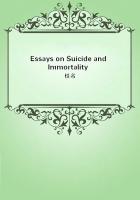<Memory>.His analysis of this power, which will be found to contain such elements as retention, phantasy, association, and recognition, is not at all searching.But he is successful in showing that it is an original faculty, and he has a number of useful, though somewhat superficial, remarks upon its mode of operation.He describes memory as giving us an immediate knowledge of things past, which leads to a very severe criticism by Hamilton, who remarks that an immediate knowledge {216} of things past is a contradiction.
But Reid does not use the word `immediate' in the same rigid sense as Hamilton: all that he means is that, in our recognition of the past, there is no reasoning or any other discursive process.Hamilton is right when he says that the immediate object before the mind is a phantasm or representation in the mind; but it is also true that in memory we go intuitively, beyond the representation in the mind, to the past occurrence which it represents.Reid says that "our notion of duration, as well as our belief in it, is got by the faculty of memory." Whereon Hamilton remarks that this is to make " time an empirical or generalized notion," and then tells us that time is a necessary notion, arising on the occasion of experience.But Reid's doctrine is the more correct of the two.In every act of memory we have the remembrance of an event in time past, and have thus the idea of time in the concrete, and get the idea of time in the abstract by separating the time from the event; and upon reflection we discover that there are necessary convictions involved in our belief in time.Reid's account of the idea of time, though not exhaustive, is thus correct so far as it goes.By not calling in a faculty of recognition, Hamilton has not been able to show how we get the idea of time, and has been obliged with Kant to make it some sort of <a priori> form.
<Conception>.Under this phrase he includes three things.They are either the conceptions of individual things, the creatures of God; or they are conceptions of the meaning of general words; or they are the creatures of our own imagination." He has sensible remarks as to each of these, but not a good nomenclature to indicate the distinctions.It is in this essay that he treats of the train of thought in the mind, which he does in a superficial manner, compared even with his predecessors Turnbull and Hutcheson.
<Abstraction>.He does not distinguish so carefully as he should have done between the abstract and general notion.
He has a glimpse of the distinction between the comprehension and extension of a general conception." The species comprehends all that is in the genus, and those attributes, likewise, which distinguish that species from others belonging to the same genus, and, the more subdivisions we make, the names of the lower become still the more comprehensive in their signification, {217} but the less extensive in their application to individuals." (P.
391.) In regard to the subjects discussed by the nominalists, realists, and conceptualists, he is a moderate conceptualist, dwelling fondly on the necessity of observing the points of resemblance in the objects placed in the group.He has some good remarks on the formation of general notions, but does not discover -- what is, after all, the essential point-the putting together in the class all the objects possessing the common attribute, or attributes, fixed on.His realistic tendency is seen in the remark:
"When I speak of general notions, or general conceptions, Ialways mean things conceived, and not the act of the mind in conceiving them." (P.404.)<Judgment>.Under this head we are introduced to the full discussion of his favorite subject, common sense, which he says means common judgment." We ascribe to reason two offices, or two degrees.The first is to judge of things self-evident the second, to draw conclusions which are not self-evident from those that are.The first of these is the province and the sole province of common sense; and therefore it coincides with reason in its whole extent, and is only another name for one branch or degree of reason."(P.425.) He divides the principles of common sense into two classes: -- as they are contingent; or as they are necessary and immutable, whose contrary is impossible.
I.P/RINCIPLES OF C/OMMON S/ENSE RELATING TO C/ONTINGENTT/RUTH.
1.The existence of every thing of which I am conscious.
2.The thoughts of which I am conscious are the thoughts of a being which I call myself, my mind, my person.
3 Those things did really happen which I distinctly remember.
4.Our own personal identity and continued existence as far back as we remember distinctly.
5.Those things do really exist which we distinctly perceive by our senses, and are what we perceive them to be.
6.We have some degree of power over our actions, and the determinations of our wills.
7.The natural faculties by which we distinguish truth from error are not fallacious.{218}
8.There is life and intelligence in our fellow-men with whom we converse.
9.That certain features of the countenance, sounds of the voice, and gestures of the body, indicate certain thoughts and dispositions of the mind.
10.There is a certain regard due to human testimony in matters of fact, and even to human authority in matters of opinion.
11.There are many events depending on the will of man in which there is a self-evident probability, greater or less according to circumstances.
12.In the phenomena of nature, what is to be will probably be like to what has been in similar circumstances.
II.P/RINCIPLES RELATING TO N/ECESSARY T/RUTHS.
1.Grammatical; as, that every adjective in a sentence must belong to some substantive expressed or understood.
2.Logical axioms; such as, any contexture of words which does not make a proposition is neither true nor false.
3.Mathematical axioms.
4.Axioms in matters of taste.
5.First Principles in Morals; as, that an unjust action has more demerit than an ungenerous one.















